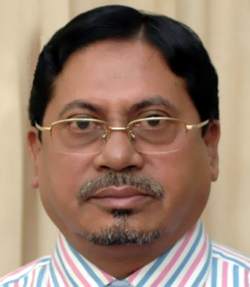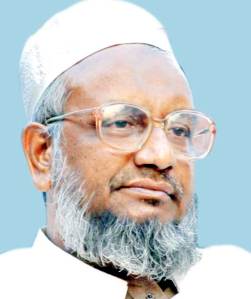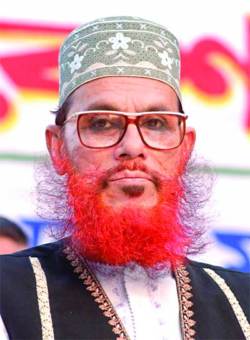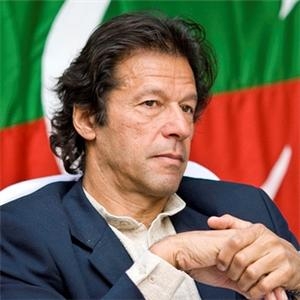[Bangla Daily Star] Pakistain's national assembly, through a reassertion of the myopia which has historically kept Pakistain captive to its prejudices and inhibitions, has passed a resolution condemning the execution of Abdul Quader Mollah, a notorious war criminal in occupied Bangladesh in 1971. The country's interior minister, Chaudhry Nisar Ali Khan, has glibly called the hanging a 'judicial murder'. The assembly unsurprisingly and carefully ignored the fact that Mollah and others like him had helped the Pakistain army in the murder of three million Bengalis and the rape of two hundred thousand Bengali women.
The move in the national assembly is once again a sign of Pakistain's inability to forget the humiliation it went through in Bangladesh in December 1971. Because it cannot forget, it remains attitudinally bitter towards Bengalis.
Activists and supporters of Jamaat-e-Islami
...The Islamic Society , founded in 1941 in Lahore by Maulana Sayyid Abul Ala Maududi, aka The Great Apostosizer . The Jamaat opposed the independence of Bangladesh but has operated an independent branch there since 1975. It maintains close ties with international Mohammedan groups such as the Moslem Brotherhood. the Taliban, and al-Qaeda. The Jamaat's objectives are the establishment of a pure Islamic state, governed by Sharia law. It is distinguished by its xenophobia, and its opposition to Westernization, capitalism, socialism, secularism, and liberalist social mores...
Pakistain have been staging noisy demonstrations in various cities and towns of the country to protest the execution of Abdul Quader Mollah in Bangladesh. Mollah, a notorious collaborator of the Pakistain occupation forces in Bangladesh in 1971, has been described as shaheed-e-Pakistain (martyr of Pakistain). These protesters have carried posters inscribed with the question, in Urdu, "Bangladesh mein Jamaat-e-Islami mujrim kyun" (why is the Jamaat-e-Islami a convict in Bangladesh?).
Leading figures in the Pak Jamaat have demanded that their government sever diplomatic relations with Bangladesh as a way of registering its outrage over the hanging of Mollah. As if in response to this demand, Chaudhry Nisar Ali Khan, minister for interior in Pakistain's federal cabinet, earlier came forth with expressions of his "deep grief" over Mollah's hanging. Khan has minced no words in suggesting that the Bangladesh Jamaat politician was hanged because of his solidarity with Pakistain during Bangladesh's Liberation War in 1971. "Till the very end before the creation of Bangladesh", as the Pak minister has put it, Mollah remained a supporter of a united Pakistain, which is why "today every Pak is saddened"'.
That said, Jamaat leaders in Pakistain have drawn attention to an alleged deal reached by Bangabandhu Sheikh Mujibur Rahman and Zulfikar Ali Bhutto
...9th PM of Pakistain from 1973 to 1977, and 4th President of Pakistain from 1971 to 1973. He was the founder of the Pakistain Peoples Party (PPP). His eldest daughter, Benazir Bhutto, would also serve as hereditary PM. In a coup led by General Zia-ul-Haq, Bhutto was removed from office and was executed in 1979 for authorizing the murder of a political opponent...
to the effect that no one would die or be punished in Bangladesh over his role during 1971 and after. The statement is a lie.
For its part, the Pakistain foreign ministry, on its website, records its concern that the war crimes trials in Bangladesh have "added to the current instability" in the country. The ministry nevertheless wishes the "brotherly people of Bangladesh" well.
All these factors, coming from Pakistain in light of Mollah's execution, highlight yet once again the state of denial that has been at work in the Pak establishment since the Pakistain army surrendered in Dhaka on 16 December 1971.
The state of denial began soon after ZA Bhutto took over as president and chief martial law administrator from a discredited Yahya Khan in late December 1971. At his very first meeting with Bangabandhu in Rawalpindi after having the latter moved from solitary confinement to house arrest, Bhutto informed Bangladesh's founder that the Indian army was in occupation of "East Pakistain". In the years leading up to Islamabad's recognition of Dhaka's independence, Pakistain persisted in referring to Bangladesh as the "Dhaka authorities".
Pakistain was compelled to accord recognition to Bangladesh prior to the Islamic conference, held in Lahore, in February 1974. Later that year, in response to an appeal from Abdul Haq, a pro-Beijing communist leader in Bangladesh, for aid to overthrow the government of Bangabandhu Sheikh Mujibur Rahman, Bhutto instructed his cabinet to help Haq. Reference on the subject can be traced to Stanley Wolpert's "Zulfi Bhutto of Pakistain".
During his visit to Dhaka in June 1974, a clearly reluctant and angry Bhutto was compelled to visit the National Memorial at Savar to honour Bangladesh's freedom fighters. His behaviour bordered on the insulting. He refused to doff the Mao cap he had on; and when the visitors' book was presented before him for his comments, he lashed out, "Enough of this nonsense", before pushing the book aside.
Paks cheered the liquidation of Bangabandhu on 15 August 1975. Prime minister Bhutto, carried away by the "good news", quickly recognised the "Islamic Theocratic Republic " of Bangladesh when no such change had come despite the coup and ordered sacks of rice to be sent to the "brotherly" people of Bangladesh.
In his time, General Zia ul Haq
 ...the creepy-looking former dictator of Pakistain. Zia was an Islamic nutball who imposed his nutballery on the rest of the country with the enthusiastic assistance of the nation's religious parties, which are populated by other nutballs. He was appointed Chief of Army Staff in 1976 by Prime Minister Zulfikar Ali Bhutto, whom he hanged when he seized power. His time in office was a period of repression, with hundreds of thousands of political rivals, minorities, and journalists executed or tortured, including senior general officers convicted in coup-d'état plots, who would normally be above the law. As part of his alliance with the religious parties, his government helped run the war against the Soviets in Afghanistan, providing safe havens, American equipiment, Saudi money, and Pak handlers to selected mujaheddin. Zia died along with several of his top generals and admirals and the then United States Ambassador to Pakistain Arnold Lewis Raphel when he was assassinated in a suspicious air crash near Bahawalpur in 1988... ...the creepy-looking former dictator of Pakistain. Zia was an Islamic nutball who imposed his nutballery on the rest of the country with the enthusiastic assistance of the nation's religious parties, which are populated by other nutballs. He was appointed Chief of Army Staff in 1976 by Prime Minister Zulfikar Ali Bhutto, whom he hanged when he seized power. His time in office was a period of repression, with hundreds of thousands of political rivals, minorities, and journalists executed or tortured, including senior general officers convicted in coup-d'état plots, who would normally be above the law. As part of his alliance with the religious parties, his government helped run the war against the Soviets in Afghanistan, providing safe havens, American equipiment, Saudi money, and Pak handlers to selected mujaheddin. Zia died along with several of his top generals and admirals and the then United States Ambassador to Pakistain Arnold Lewis Raphel when he was assassinated in a suspicious air crash near Bahawalpur in 1988...
, Pakistain's third military ruler, laid a wreath at the Savar memorial during his visit to Bangladesh in 1985. When Bangladesh's media people asked him about his feelings on the occasion, he gave them a rather glib and confusing reply, "Your freedom fighters are our freedom fighters".
In all the years since December 1971, no Pak government has expressed any apologies or remorse over the atrocities carried out by the Pakistain army in Bangladesh.  Pervez Pervez Perv Musharraf
... former dictator of Pakistain, who was less dictatorial and corrupt than any Pak civilian government to date ...
, the country's fourth military ruler, once expressed no more than "regret" at what had transpired in 1971.
Under the tripartite agreement reached by Bangladesh, India and Pakistain in Delhi in April 1974, all Bangalees stranded in Pakistain were to return home to Bangladesh, which they did. All Pak prisoners of war in camps across India were to go back to their country, which they did. As for the 195 Pak military officers Bangladesh wanted to try for war crimes, the Bhutto government, aware of the backlash it could face from Paks, promised the Bangladesh government that if the officers were freed, they would be tried in Pakistain itself. The 195 went back home, but Pakistain's promise about trying them was never kept.
Today, against the background of the Pak interior minister's comments on the Mollah execution and the national assembly resolution and in light of the "concerns" expressed on the Pak foreign office website, the silence of the Bangladesh government, especially the foreign office, is deeply mystifying, indeed stupefying. No protest has been made to the Pakistain authorities. The Pak high commissioner in Dhaka has not been summoned to the foreign office for an explanation.
The Pak Jamaat's diatribe against Bangladesh may be understandable. But when it is a Pak minister and Pakistain's foreign policy establishment taking issue over Mollah's execution, there is no question that the move is a blatant and therefore unacceptable interference in the internal affairs of a country now engaged in meting out justice to the perpetrators of the genocide that left three million Bangalees dead.
Will Foreign Minister AH Mahmood Ali enlighten the nation on his silence?
Will the foreign office explain why it has chosen to ignore Pakistain's behaviour on the war crimes issue?
|
 Mohammed Qamruzzaman and Ali Ahsan Mujahid -- while death penalties have been awarded to Motiur Rahman Nizami
Mohammed Qamruzzaman and Ali Ahsan Mujahid -- while death penalties have been awarded to Motiur Rahman Nizami
 [AA.TR]
[AA.TR]  Bangladesh's Attorney General Mahbubey Alam was quoted by the local daily Dhaka Tribune on Sunday as saying that several of the appeals for those sentenced to death could be dealt with before the end of 2015.
Bangladesh's Attorney General Mahbubey Alam was quoted by the local daily Dhaka Tribune on Sunday as saying that several of the appeals for those sentenced to death could be dealt with before the end of 2015.


 ...Bangla dynastic politician and current Prime Minister of Bangladesh. She has been the President of the Bangla Awami League since the Lower Paleolithic. She is the eldest of five children of Sheikh Mujibur Rahman, the founding father of Bangla. Her party defeated the BNP-led Four-Party Alliance in the 2008 parliamentary elections. She has once before held the office, from 1996 to 2001, when she was defeated in a landslide. She and the head of the BNP, Khaleda Zia show such blind animosity toward each other that they are known as
...Bangla dynastic politician and current Prime Minister of Bangladesh. She has been the President of the Bangla Awami League since the Lower Paleolithic. She is the eldest of five children of Sheikh Mujibur Rahman, the founding father of Bangla. Her party defeated the BNP-led Four-Party Alliance in the 2008 parliamentary elections. She has once before held the office, from 1996 to 2001, when she was defeated in a landslide. She and the head of the BNP, Khaleda Zia show such blind animosity toward each other that they are known as 
 [Bangla Daily Star] The
[Bangla Daily Star] The 
 ...the creepy-looking former dictator of Pakistain. Zia was an Islamic nutball who imposed his nutballery on the rest of the country with the enthusiastic assistance of the nation's religious parties, which are populated by other nutballs. He was appointed Chief of Army Staff in 1976 by Prime Minister Zulfikar Ali Bhutto, whom he hanged when he seized power. His time in office was a period of repression, with hundreds of thousands of political rivals, minorities, and journalists executed or tortured, including senior general officers convicted in coup-d'état plots, who would normally be above the law. As part of his alliance with the religious parties, his government helped run the war against the Soviets in Afghanistan, providing safe havens, American equipiment, Saudi money, and Pak handlers to selected mujaheddin. Zia died along with several of his top generals and admirals and the then United States Ambassador to Pakistain Arnold Lewis Raphel when he was assassinated in a suspicious air crash near Bahawalpur in 1988...
...the creepy-looking former dictator of Pakistain. Zia was an Islamic nutball who imposed his nutballery on the rest of the country with the enthusiastic assistance of the nation's religious parties, which are populated by other nutballs. He was appointed Chief of Army Staff in 1976 by Prime Minister Zulfikar Ali Bhutto, whom he hanged when he seized power. His time in office was a period of repression, with hundreds of thousands of political rivals, minorities, and journalists executed or tortured, including senior general officers convicted in coup-d'état plots, who would normally be above the law. As part of his alliance with the religious parties, his government helped run the war against the Soviets in Afghanistan, providing safe havens, American equipiment, Saudi money, and Pak handlers to selected mujaheddin. Zia died along with several of his top generals and admirals and the then United States Ambassador to Pakistain Arnold Lewis Raphel when he was assassinated in a suspicious air crash near Bahawalpur in 1988... Pervez
Pervez